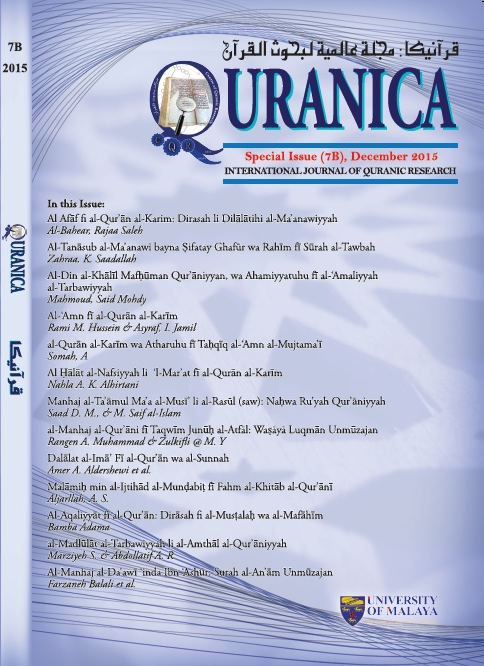Dalālat al-Imā’ fi al-Qur’ān wa al-Sunnah دلالة الإيماء في القرآن والسنة
Main Article Content
Abstract
تعتبر دلالة الإيماء من مسالك العلة المهمة التي اعتمد عليها الأصوليون في استنباط الأحكام واستثمارها من الآيات القرآنية وأحاديث المصطفى (r)، فهي تقترن بتعليل الأحكام، ففهم التعليل ينتج عنه إضافة الحكم إلى الوصف المناسب من بين الأوصاف التي يحتويها النص القرآني أو الحديث، فعندما يفرق الشارع في الحكم بين شيئين بذكر وصفٍ لأحدهما؛ يُعلم أن ذلك الوصف علّة لذلك الحكم، وعندما يحكم الشارع على شخص بحكمٍ بعد علمه بصفة صدرت منه؛ يُعلم أن تلك الصفة هي سبب الحكم، فلو لم يكن الوصف المذكور مؤثراً في الحكم، لم يكن ذكره مفيداً، والقرآن الكريم والسنة النبوية منزهة من فضل الكلام ولَغْوه، لذا فالإيماء وغيره من دلالات الألفاظ مهمة؛ فالنصوص متناهية بعكس الأحداث والوقائع فإنها ليست كذلك، لهذا يذهب البحث إلى النظر في النصوص وما تحتمله من معانٍ ومقاصد ودلالات يستفاد بها في إيجاد فتاوى لمستجدات ووقائع متسارعة
Downloads
Article Details
Disclaimer
QURANICA makes every effort to ensure the accuracy of all its contents. However, opinions, discussions, views and recommendations are expressed in this journal do not necessarily reflect the official policy of QURANICA or views of its editors or publishers. Therefore, QURANICA and its publishers will not be liable for any controversy may be arisen. The journal reserves the right, at its sole discretion, to change its terms and conditions of publications.
Copyright
It is a condition of publication that manuscript submitted to the journal have not been published, accepted for publication, nor simultaneously submitted for publication elsewhere. By submitting a manuscript, the author(s) agrees that copyright for the article is transferred to the publisher, if and when the manuscript is accepted for publication.
